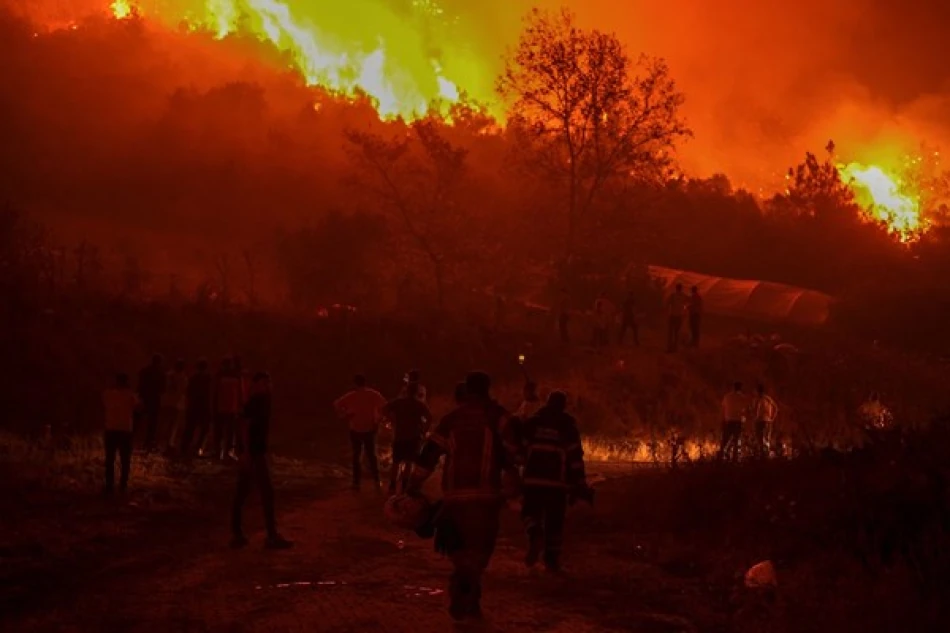
Turkey Battles Raging Forest Fires: Unwavering Efforts to Protect Vital Ecosystems
Turkey Battles Massive Wildfires as Climate Crisis Intensifies Fire Season
Turkey has evacuated over 5,300 people in recent days as wildfires rage across multiple provinces, highlighting the country's growing vulnerability to climate-driven disasters. The blazes near industrial hub Bursa and in the heavily forested Karabük province underscore how extreme weather is becoming a recurring threat to Turkey's economy and population centers.
Bursa Fires Threaten Major Industrial Center
More than 3,500 residents were evacuated over the weekend from areas surrounding Bursa, Turkey's fourth-largest city and a crucial manufacturing hub in the country's northwest. The fires have burned for over 24 hours despite efforts by 2,300 firefighters and rescue workers battling the flames amid fierce winds.
Agriculture and Forestry Minister Ibrahim Yumaklı deployed a massive response operation, including over 850 vehicles, six aircraft, and four helicopters. The scale of the mobilization reflects the strategic importance of protecting Bursa, home to major automotive and textile industries that drive Turkey's export economy.
Rising Temperatures Complicate Firefighting Efforts
Weather forecasts predict temperatures will climb toward 40°C (104°F) in coming days, creating conditions that could rapidly expand the fire's reach. This temperature spike mirrors the extreme heat waves that have devastated Mediterranean countries in recent summers, from Greece's deadly 2023 fires to Spain's record-breaking blazes.
Northern Province Faces Five-Day Battle
In Karabük province, firefighters have struggled for five days against flames in terrain where forests cover 72% of the landscape. The mountainous topography has forced the evacuation of over 1,800 residents as fires spread across dozens of kilometers.
Turkish media reports describe the challenging geography as a major obstacle for firefighting teams, similar to conditions that have hampered efforts in California's wildfire-prone regions. The extended duration of this particular blaze suggests either inadequate initial response capacity or exceptionally difficult conditions.
A Summer of Fire Exposes Systemic Vulnerabilities
President Recep Tayyip Erdoğan announced that Turkey has extinguished over 3,000 fires since summer began—a staggering figure that reveals the scope of the country's wildfire crisis. This number far exceeds typical seasonal averages and indicates that Turkey's fire season has intensified dramatically.
Extended Fire Season Becomes New Reality
Turkish authorities warned Sunday that fire risk will persist until October, effectively doubling the traditional fire season. This extended timeline mirrors trends across the Mediterranean basin, where climate change has created year-round fire conditions in regions once considered safe during autumn months.
The prolonged risk period will strain Turkey's firefighting resources and emergency response systems, potentially requiring significant budget reallocations and international cooperation agreements similar to those established by EU countries.
Economic and Strategic Implications
The targeting of fires around Bursa carries particular economic significance, as the region hosts factories for global brands including automotive giants and textile manufacturers serving European markets. Extended disruptions could affect Turkey's industrial output during a period when the country is already managing high inflation and currency pressures.
For regional stability, Turkey's wildfire crisis adds another layer of complexity to a country already managing refugee populations, earthquake recovery efforts, and geopolitical tensions. The government's ability to effectively respond to natural disasters has become a key measure of administrative competence in Turkish politics.
As Mediterranean countries increasingly face similar climate challenges, Turkey's experience may serve as a test case for how middle-income nations can adapt their emergency response systems to handle more frequent and severe natural disasters.
Most Viewed News

 Layla Al Mansoori
Layla Al Mansoori






